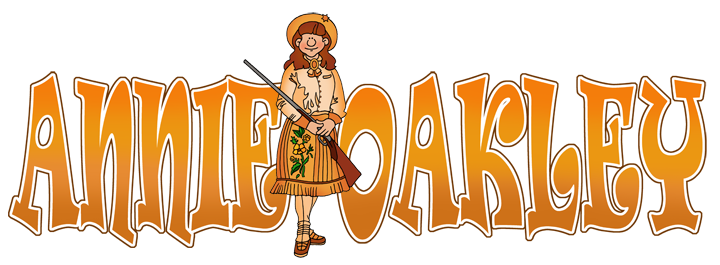"I ain't
afraid to love a man. I ain't afraid to shoot him either."
Annie Oakley
Annie Oakley
Any woman with a quote like that has got to be an interesting person to learn about, or have dinner with, but perhaps is not the right woman to marry. If you know next to nothing about one of the most famous women from Ohio, it's time to read on.
First off, who knew that Annie Oakley wasn't her real name? Phoebe Ann Moses (or Mosey, depending on your resources) was born on August 13, 1860, in Willowdell (near Dayton) in Darke County to Jacob and Susan Moses, Quakers originally from Pennsylvania. Not one to stay at home and play dolls with her sisters, Annie learned hunting and trapping from her father. At seven she was trapping, and by eight hunting, to help support her mother and family after her father died. It was very fortunate she had an extraordinary talent with a gun. By the time she was 15, Annie earned enough to pay off the $200 mortgage of her mother's home.
It didn't take long for Annie to develop a reputation as a sharpshooter. This lead to a Thanksgiving shoot out with a professional sharpshooter named Frank Butler. Frank, ten years her senior, didn't know what he was up against. He shot 24 of 25 targets. But, when the teenager took aim, she hit 25 of 25 targets. Butler might have lost the contest, but he decided to put a ring on it anyway. He and Annie were married a year later, and the marriage lasted fifty years.
They moved to Cincinnati for a while and lived in a neighborhood called Oakley. And, a stage name was born! However, off stage, she remained Mrs. Frank Butler.
In 1885, the couple joined Buffalo Bill's Wild West show and toured for sixteen years. Annie was not only an American star but she became an international sensation performing for Queen Victoria in England, Kaiser Wilhelm II in Germany, and other European leaders. Perhaps most interesting was her friendship with Sitting Bull, the Lakota Sioux leader from Little Big Horn fame. They met in 1884 and he adopted Annie, calling her "Watanya Cicilla" (Little Sure Shot). The following year, Sitting Bull joined Annie on the Wild West show for a four-month tour.
Annie knew how to entertain. She had extraordinary tricks up her sleeve thanks to her amazing eye hand coordination. She could shoot a dime tossed in the air or an apple off her dog's head, snuff out a lit candle, hit targets looking into a mirror, and split a playing card held by the edge. And, in spite of her famous quote, Annie frequently shot off the tip of a cigar from her husband's mouth.
After her days with Buffalo Bill, Annie continued her public career as an actress. Thomas Edison, a friend of Buffalo Bill, had both Oakley and Butler perform in the film, "Little Sure Shot of the Wild West". In 1902, she performed in a play written for her called "The Western Girl". Her story eventually inspired other actresses in the 1946 Irving Berlin musical "Annie Get your Gun" and film productions in 1935 and 1950 "Annie Oakley" and "Annie Get Your Gun".
Throughout her life, Oakley taught women how to shoot a gun. She wanted women to be educated, independent, and able to defend themselves. It's estimated she taught nearly 15,000 women her skills.
Even into her sixties, Annie Oakley set records in shooting. At age 62, in 1922, she entered a contest hitting 100 clay targets in a row. Unfortunately, later that same year, she and Frank were in a car accident. Annie recovered, but her health declined in 1925, and she died at 66 on November 3, 1926.
Butler was greatly affected by her death. He stopped eating and died eighteen days after Annie. Rumor has it that her cremated ashes, inside one of her trophies, were tucked into Butler's coffin in Greenville, Ohio. A visit to Greenville should include the cemetery as well as the National Annie Oakley Center.
